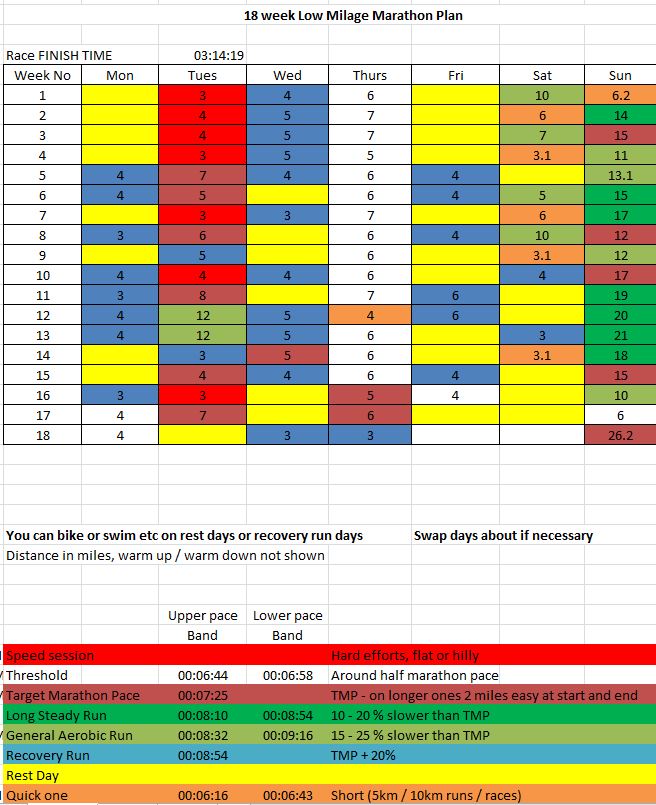I recommend the book Advanced Marathoning, this will give you a lot of knowledge and information.
You need to have a realistic target finish time in mind. A good simple formula is double your half marathon time and add 15 minutes (I add 10). So if you can run a 1:25 half this could get you a 3:00 – 3:05 marathon.
Sample 18 week training plan is below. This is a guide, swap days about as you need to. Don’t worry about missing a week through illness. If your tired, miss a run or cut it short. Add a few races in, I would. 10km and half marathons fit in well with the plan.
Definitions of runs:
- VO2 Max Intervals (Speed Session) – Typically 600m to 1600m at current 5k pace, recovery typically between half the time taken to run the interval to the full time taken to run the interval.
- Speed training – Reps of between 50 to 150m. Typically 10 x 100m with acceleration over the first 70m and the float for the last 30m. 100m walk recovery between.
- Threshold Runs – tempo runs of at least 20 minutes at approximate half marathon pace – 82 to 91% of your max heart rate.
- Marathon Pace Runs – Just that – 79 to 88% of your max heart rate.
- Long Runs (16+ miles) and Medium Long Runs (12+ miles) – 16 miles or further (10 to 20% slower than your TMP) – start at 20% and build up to 10% – 74 to 84% of your max heart rate.
- General Aerobic Runs – Up to 12 miles, start slower than recovery runs and build up to a little quicker than recovery runs (15 to 25% slower than your TMP) – 70 to 81% of your max heart rate
- Medium Long Run – 11 to 15 miles (same pace as long runs)
- Recovery Runs – Relatively short runs (4 or 5 miles) – half way through the run do some strides x 5 (if you want to). (20% slower than your TMP) – Below 76% of max heart rate
Considering Heart Rate
I do not train to heart rate, I have provided the bands for those who wish to. I train to pace and look at my heart data after the run. Different people will tell you different bands for your heart rates. Different books will use different formulas. Different watches might work out your bands differently. With experience you can work your own out.
To work out your max heart rate, one theoretical formula is 207 – 0.7 x your age, so for me this gives 180.
To work out your max heart rate by doing a interval session (if not feeling well don’t attempt it), just find a 600m long moderate hill, do a gentle warm up run three high intensity repeats, jogging back down. If you run these 600’s flat out your heart rate should be within 2 or 3 beats of your maximum at the end of the third repeat. Do a gentle warm down. You may have to repeat this a few times to get an average.
Tips
I recommend using at least two different pairs of running shoes which are different makes, and alternate between the two. Comfort is key, I run in Mizuno Wave Inspire and Saucony Omni, both available for about £60. The slight difference in shoes will reduce the risk of injury and give the shoes a chance to recover after a run..
One simple fitness test we all can use every day – run up a flight of stairs and see how you feel at the top, if its easy then your ready for a good run session. If its tough then evaluate what you will do and run a bit easier than you planned to.
You should warm up before all runs, minimum 1 mile steady, include some drills when warmed up but be aware of injury if the drills are new to you. Simple drills are high knees, bum kicks and strides. You should stretch after all runs.
You should expect some runs to go badly, don’t worry about this. Get the bad runs out of the way before race day. I always have a terrible long run building up to a Marathon.
If you don’t have a garmin watch I highly recommend investing in one or similar to record your runs and to see your pace in real time.
If you have some running friends of similar ability try to get them to run with you or consider joining a running club.
Supplements
I use SIS recovery and energy supplements. They are easily available at Supermarkets. During the marathon I take a gel every 30 minutes. Get a belt to carry them. Hydration, for runs over 1 hour I run with a bottle belt, I like to do this as I am carrying extra weight that I will not have in the race, I only drink water as supplements in water might not be compatible with the gels. If you cannot take gels, try jelly babies.

